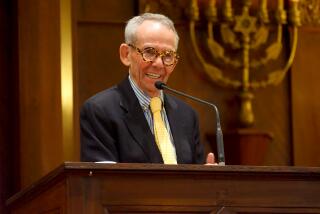Sin in the 21st century
- Share via
It must have been in the spirit of intellectual fun that the New York Public Library and Oxford University Press organized a series of lectures on the seven deadly sins, which were formalized by Pope Gregory the Great in the 6th century. Their relevance in this strongly secular age is, well, just what the seven lecturers made of them.
Essayist Joseph Epstein, for 20 years editor of the Phi Beta Kappa magazine the American Scholar, turned his assignment, on envy, into a droll, acerbic and in the end quite sensible look at this aspect of human nature. Of all the seven deadlies -- the others are pride, anger, sloth, greed, gluttony and lust -- only envy, Epstein concludes, contains nothing at all commendable.
“Whatever else it is,” Epstein writes, “envy above all is a great waste of mental energy. While it cannot be proved whether or not envy is part of human nature, what can be proved, I think, is that, unleashed, envy tends to diminish all in whom it takes possession. Wherever envy comes into play, judgment is coarsened and cheapened.... “
“If the very notion of ‘sin,’ original or unoriginal, as damning simply makes no sense to you, I would invite you instead to consider envy less as a sin than as very poor mental hygiene. It blocks out clarity, both about oneself and the people one envies, and it ends by giving one a poor opinion of oneself. No one can see clearly anything he or she envies. Envy clouds thought, clobbers generosity, precludes any hope of serenity, and ends in shriveling the heart -- reasons enough to fight free of it with all one’s mental strength.”
Epstein says that while he relied on some books for his essay, “much more of its material comes from simply living in the world and gazing about.” The quaint phrase “gazing about” describes nicely what one expects of an essayist -- a point of view, acute observation, with personal prejudices thrown in for spice. Epstein does not disappoint.
He is quite funny as, with the help of philosopher Robert Nozick, he explores the presence of envy in academic life. Nozick’s view, Epstein says, “was that university teachers were almost invariably people who, because of their superior performance in school, were told over and over again how bright and extraordinary they are. This continued for 20 years -- from grade through graduate school -- with sufficient reinforcement, that is, for them to be convinced of its truth. They remain in the environment, that of the classroom, that has long been the scene of all their rewards, by becoming teachers.
“It all seems like a good life, but soon it is spoiled by the realization that people who did less well than they in school seem to be faring rather better in the world. Not quite first-class lawyers are making hundreds of thousands of dollars a year; dullish boys and girls, now practicing medicine, have large summer homes near gentle lakes.... It’s damn unfair.”
This take on envious academics is itself damn unfair, in that it ignores the often hard work and occasionally great talent that lie in those who teach the rest of us, but in the world of the personal essay tartness is permitted as the price of a sharp ironic eye.
Epstein’s eye roams from Melville’s “Billy Budd, Sailor” -- “the greatest story in Western literature with pure envy at its center” -- to Martha Stewart, whose travails bring out in many of us the guilty pleasure of schadenfreude.
Envy, Epstein notes, is also a possible component of anti-Semitism. “Envy doesn’t need much in the way of excuses to begin humming,” he writes, “and the Jews, throughout their long and complex history, but especially through their successes in the face of adversity, have offered excuses aplenty.” Epstein concludes that of all the seven deadly sins, envy may be the most corrosive of human personality and potential.

